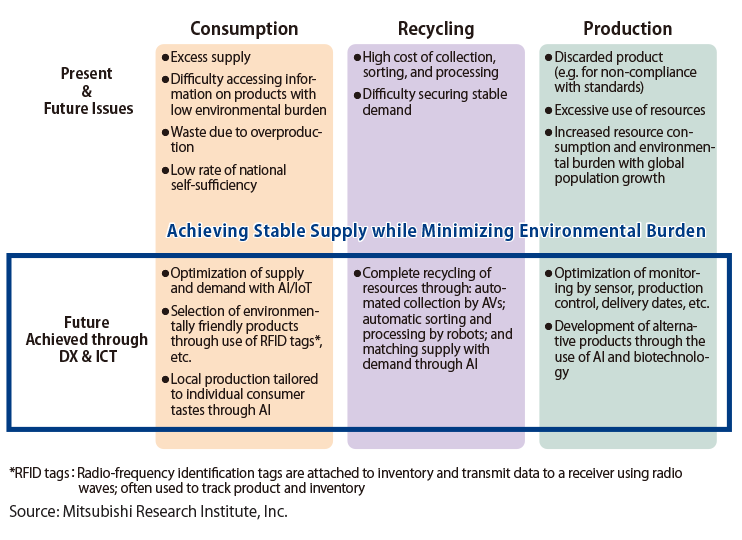Economic growth and technological advancement have raised the standard of living on a global level but have also caused the deterioration of the world’s environment, which is the basis for human survival. There is concern that in 50 years, the global population will approach 10 billion and our society will face the limit to growth. To ensure future abundance and sustainability for 10 billion people, we must curb consumption, increase recycling, and decrease the environmental burden of production (Figure). The key to success in these activities requires the advanced utilization of information communication technology, in other words digital transformation (DX).
While DX has been developed primarily to resolve the issues of private companies, its role in resolving societal issues will become more prominent in the future. In curbing consumption, DX can help to reduce losses in production, distribution, and energy consumption. Big data enables improvements in demand forecasting while blockchain technology can help to securely integrate supply chains and provide demand-side data in real time. Together, these technologies can facilitate the production and distribution of the right amount of goods at the right time.
For recycling, DX can facilitate the complete recycling of resources through technologies such as collection by autonomous vehicles (AVs), automatic sorting and processing by robots, and matching supply and demand through artificial intelligence (AI).
On the supply side, it is necessary to sustain society using fewer resources. Particular requirements will include improved efficiency in supplying only the minimum amount of necessary resources as well as a reduction in environmental burden. Agriculture, for example, will see the application of advanced sensing technology for real time monitoring of crop conditions and insect damage. This data will then be linked to farming machinery, allowing for maximum yields with minimal resources.
In the future, the application of a broader form of DX will become prominent. For recycling, comprehensive ecosystems will be set up that encompass multiple fields such as water, resources, and energy. Supply-and-demand networks will be reorganized to cover all aspects from consumption and recycling to production. Incredible uses will arise that cannot yet be imagined.
DX aimed at resolving societal issues seeks to improve the efficiency of society as a whole but can at times hold drawbacks for a given individual. For example, accurate matching of supply and demand on a macro level could result in reduced sales for individual manufacturers. Thus, because of DX’s potential for large and disruptive influence, the world stands in need of entities that promote DX that optimizes the whole and resolves societal issues, rather than partial optimization for individual groups. MRI is ready to meet this challenge.
While DX has been developed primarily to resolve the issues of private companies, its role in resolving societal issues will become more prominent in the future. In curbing consumption, DX can help to reduce losses in production, distribution, and energy consumption. Big data enables improvements in demand forecasting while blockchain technology can help to securely integrate supply chains and provide demand-side data in real time. Together, these technologies can facilitate the production and distribution of the right amount of goods at the right time.
For recycling, DX can facilitate the complete recycling of resources through technologies such as collection by autonomous vehicles (AVs), automatic sorting and processing by robots, and matching supply and demand through artificial intelligence (AI).
On the supply side, it is necessary to sustain society using fewer resources. Particular requirements will include improved efficiency in supplying only the minimum amount of necessary resources as well as a reduction in environmental burden. Agriculture, for example, will see the application of advanced sensing technology for real time monitoring of crop conditions and insect damage. This data will then be linked to farming machinery, allowing for maximum yields with minimal resources.
In the future, the application of a broader form of DX will become prominent. For recycling, comprehensive ecosystems will be set up that encompass multiple fields such as water, resources, and energy. Supply-and-demand networks will be reorganized to cover all aspects from consumption and recycling to production. Incredible uses will arise that cannot yet be imagined.
DX aimed at resolving societal issues seeks to improve the efficiency of society as a whole but can at times hold drawbacks for a given individual. For example, accurate matching of supply and demand on a macro level could result in reduced sales for individual manufacturers. Thus, because of DX’s potential for large and disruptive influence, the world stands in need of entities that promote DX that optimizes the whole and resolves societal issues, rather than partial optimization for individual groups. MRI is ready to meet this challenge.
Figure: Balanced Ecosystem of Stable Supply & Minimal Environmental Burden

